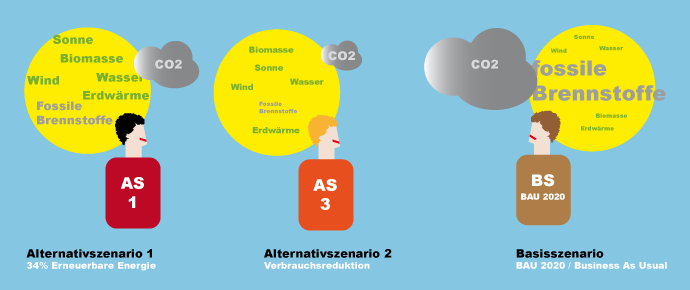
Energy and Climate
The dominant energy systems in the world today are counteracting sustainable development. They are based on fossil fuels, and marked by a steadily growing hunger for energy. Climate change, primarily a consequence of the excessive use of fossil fuels, poses a big challenge for humankind. Moreover, fossil resources are finite, often come from politically unstable countries and there is a high inequality in energy use. High levels of energy consumption, as currently observed in industrialized countries, can hardly work on renewable energies. Therefore, a transition to more sustainable energy systems is urgently needed! This transition must include both, a reduction of energy consumption and a shift to renewable energies. Our research on “energy and climate” investigates how energy systems can be made socially, ecologically and economically sustainable. The second focus lies on the effects of climate change and the analysis of adaption strategies. At SERI, we approach Energy, as a central issue of sustainability, from various sides:
- Study of sustainable energy systems with respect to renewable energy (supply side), energy efficiency and conscious user behaviour (demand side) as well as energy policies.
- Modelling and analysis of economic, environmental (resource consumption, energy consumption, emissions of CO2) as well as social effects (distributive justice, energy poverty) of energy use
- Analysis of energy use in the private context and participatory processes to raise awareness leading to behavioural changes. SERI developed a unique, representative database on energy use patterns in private Austrian households: www.energisch.at
- Analysis of energy use in companies including the embodied energy in production processes
- Resource use and energy consumption: Material flow analysis of fossil fuels, the impact of increasing use of renewable energy sources on the availability of commodities.
Under the climate topic, we deal with (future) impacts of climate change on the economy, ecology and society. What possibilities are there to keep these to a minimum (adaptation) and to prevent them already in advance (mitigation)? A major focus is the relationship between biodiversity and climate change. To do this, we employ the following methods:
- Participatory development of energy scenarios on national and European level
- Economic-ecological (participatory) modelling of scenarios
- Development of criteria and indicators on national and product level
- Carbon footprint analysis on basis of products, companies, sectors and countries
- Integrated Sustainability Assessments or Multi-Criteria Assessments
- Trans-disciplinary development of policy recommendations
- (Participatory) development of adaptation measures focusing on human and social capital

![[date]](/wp-includes/images/smilies/date.png) News
News![[paper]](/wp-includes/images/smilies/report.png) Publications
Publications![[person]](/wp-includes/images/smilies/user.png) People
People![[projects]](/wp-includes/images/smilies/bricks.png) Projects
Projects![[people]](/wp-includes/images/smilies/group.png) Partners
Partners
Auch wir haben uns auf ökologisch nachhaltige und “grüne” IT spezialisiert und bieten CO2 neutrales Serverhosting, umweltfreundliche Printprodukte und atemberaubende One und Single Page Homepages, Blogs und Websites and. Mehr infos auf: http://greenitsolutions.at/